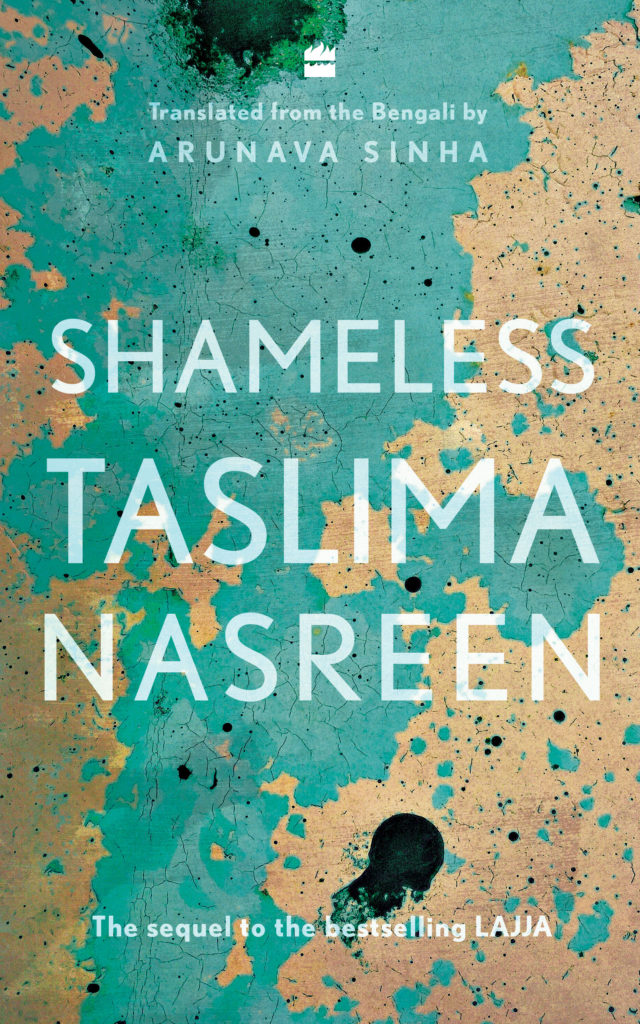Taslima Nasreen’s “Shameless”

In 1993 Taslima Nasreen wrote Lajja ( “Shame”) in Bengali. It was her response to the anti-Hindu riots that had broken out in Bangladesh after the demolition of the Babri Masjid, Ayodhya, India on 6 December 1992. The novel was published in Bengali and within six months sold over 50,000 copies. It brought the author “fame” that till then had been unheard of in the subcontinent. Prior to this, the only other author to have had fatwas issued against them was Salman Rushdie, an author of South Asian origin but residing in UK at the time. Lajja became one of the first books in translation to be talked about by many readers internationally and this was at a time even before the Internet. ( Dial-up modems, with limited email access, were introduced in India in 1996!) Lajja became a bestseller rapidly. The English edition for the subcontinent was published by Penguin India. Subsequently a new translation was commissioned by Penguin India in 2014-15. The translator of the later edition was Anchita Ghatak. The book was banned in Bangladesh and fatwas were issued against the author. Taslima Nasreen fled to Europe and later laid roots in India. At first she chose to live in Calcutta/ Kolkatta and is now based in Delhi. Years later, Taslima Nasreen still needs security cover wherever she travels.
Lajja was explosive when it was first published as it was a Muslim author, upset by the communal riots in her land, who was writing sympathetically about a Hindu family. The story details the progressive radicalisaion of Suranjan who firmly believes in a nationalist Hindu outlook. So much so it is a belief he continues to nurture even after he, along with his family, flee Bangladesh to become refugees in India. In India he becomes a member of a Hindu nationalist party. Pirated editions of Lajja were sold in India. It became an international bestseller and was translated into many languages. Taslima Nasreen, a doctor by training, has become an established writer with more forty publications. She defines herself as “a secular humanist, a human rights activist, and a prolific and bestselling author, who has faced multiple fatwas calling for her death”.
More than twenty-five years later, Taslima Nasreen is back with a sequel to Lajja. It is called Shameless. Arunava Sinha, the translator, told me “the original title was Besharam but eventually the Bengali book was published, also in 2020, with a very tame title, e kul o kul. The book was written more than ten years though.” Nevertheless Shameless is a unique experiment in writing a novel. It has shades of Pirandello’s “Six Characters in Search of An Author” with Suranjan as the protagonist but in conversation with Taslima Nasreen. The opening pages of the novel have Suranjan, the character, visit Taslima Nasreen, the author, and bring her up-to-date with the events in his life. It then develops into a fascinating narrative where a novel is obviously being drafted but it has so many overlaps with reality. With the author-turned-character (or is it character-turned-author?) providing pithy comments and at times intervening in the story by persuading the characters to act in one way or the other. It is a work of art. Shameless is a sequel to Lajja but seems more that that — Taslima Nasreen seems to have sort of trickled into the space between reality and fiction to put herself under the lens. But the conversation is more than that. It is a conversation between writer and character, commentary on the turbulent times. Taslima Nasreen’s was an emotional response to the increased communalisation in the subcontinent after the fall of the Babri Masjid. It was not necessarily literary writing. But in the intervening years Taslima Nasreen has evolved as a writer. With Shameless she has given herself space to speak frankly without hopefully attracting any more bounties for her head. Also the writing is very close to her memoir (Dwikhondito, 2003, translated into English as Split: In Two, 2018 — translated by Maharghya Chakraborty). Interestingly in recent years her voice as an author comes through very strongly in the English translations despite her experimentation with a gamut of translators. A testament to her strong writing. There are sufficient examples in the novel that indicate her belief in being a secular humanist stem from having experienced or witnessed firsthand many incidents in the name of religion. Much of this she distills into her writing of Shameless, exemplifying how much of the personal informs the political.
Arunava Sinha’s translation is superb. He is a renowned translator who has made available many Bengali writers in English but with Shameless his professional expertise as a translator par excellence is established. He channels Taslima Nasreen’s authorial voice beautifully. His past experience of working with Bengali authors has helped him tremendously to hone his expertise in being utterly respectful to the desire of the author to be heard in the original language and carry it forth impeccably into the destination language, enabling the readers in English to appreciate the text for what it is. It works brilliantly in a translation like Shameless where the author herself has a lot to say, much of it tricky.
The time lapse between the publication of Lajja (1993) and Shameless (2020) marks a significant period of socio-political history in the subcontinent as well. With Shameless Taslima Nasreen seals her place as a relevant author who creates political art, a need of the times when plainspeak is not necessarily always welcome.
6 May 2020
